‘Game changing’ EU satellite programme to provide real-time greenhouse gas emissions monitoring
A ‘constellation’ of satellites will be able to pinpoint emissions to individual premises around the globe

Your support helps us to tell the story
From reproductive rights to climate change to Big Tech, The Independent is on the ground when the story is developing. Whether it's investigating the financials of Elon Musk's pro-Trump PAC or producing our latest documentary, 'The A Word', which shines a light on the American women fighting for reproductive rights, we know how important it is to parse out the facts from the messaging.
At such a critical moment in US history, we need reporters on the ground. Your donation allows us to keep sending journalists to speak to both sides of the story.
The Independent is trusted by Americans across the entire political spectrum. And unlike many other quality news outlets, we choose not to lock Americans out of our reporting and analysis with paywalls. We believe quality journalism should be available to everyone, paid for by those who can afford it.
Your support makes all the difference.A “constellation of dedicated satellites” is to be launched into orbit by the European Union to closely monitor humanity’s greenhouse gas emissions in detail.
Scientists working on the project said the “game-changing” tool will be able to detect carbon dioxide and methane emissions “with unprecedented accuracy and detail – and close to real time.”
The satellites – which will form part of the EU’s Copernicus Atmosphere Monitoring Service (Cams) – will even be capable of looking at individual carbon dioxide and methane sources such as power plants and fossil fuel production sites, the service said.
The project, which will be launched and fully operational by 2026, will allow scientists to routinely quantify total anthropogenic greenhouse gas emissions.
The announcement of the new satellite monitoring programme comes as world leaders have converged in Glasgow for the UN’s Cop26 climate summit at which it is hoped they will hammer out new emissions targets to stop global average temperatures soaring to more than 1.5C above what they were in the pre-industrial era.
It also means countries, companies and organisations not sticking to their climate agreements will be easily detectable.

Copernicus and other agencies are already working on the first “global stocktake” of greenhouse gas emissions, which will be completed by 2023, but the new technology will be ready for the second global assessment of humanity’s emissions, due to be completed in 2028, and should provide a greater level of detail.
Richard Engelen, deputy director of Cams, said: “Since the start of the industrial revolution, we have seen carbon dioxide levels increase faster than ever before, and there is an increasing urgency to take real steps to make very significant emission reductions.
“By providing globally consistent and high-quality data on anthropogenic emissions we can support policymakers with this enormous challenge.
“Copernicus specialises in turning science into services and we will be fully focused on delivering an observation-based CO2 monitoring capacity to help the world combat climate change.”
Join our commenting forum
Join thought-provoking conversations, follow other Independent readers and see their replies
Comments